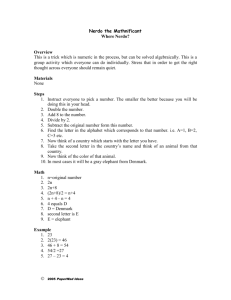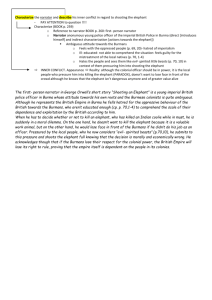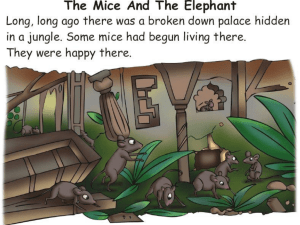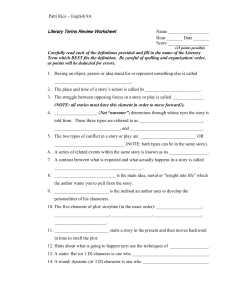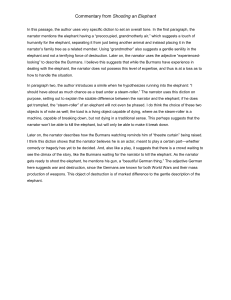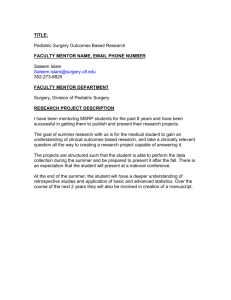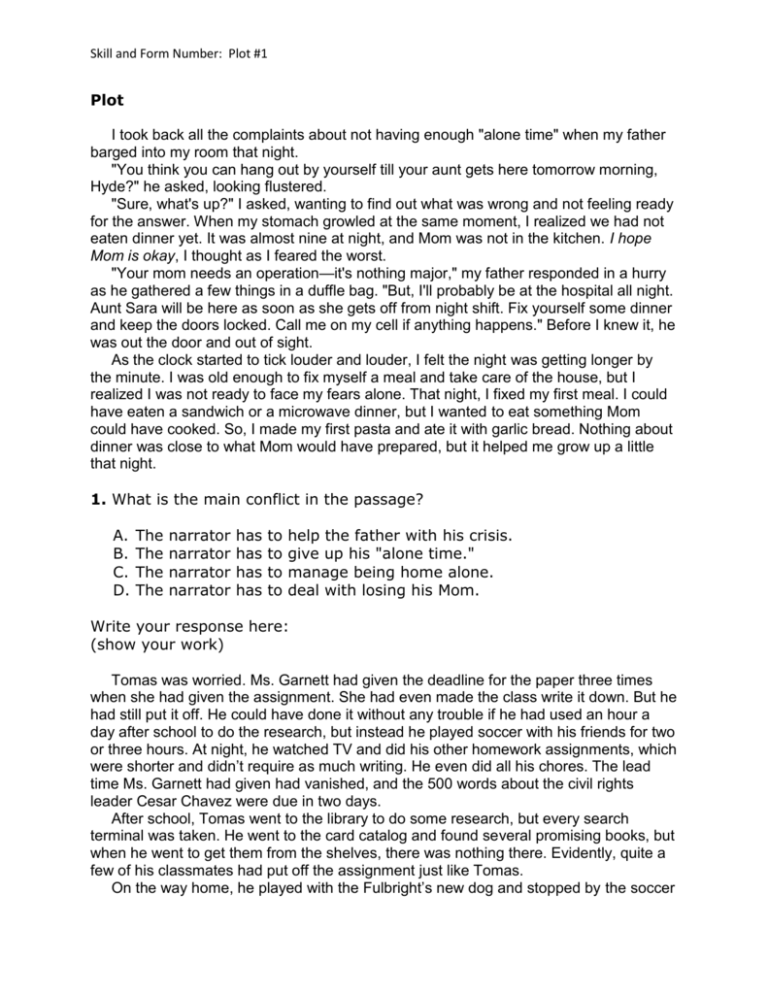
Skill and Form Number: Plot #1
Plot
I took back all the complaints about not having enough "alone time" when my father
barged into my room that night.
"You think you can hang out by yourself till your aunt gets here tomorrow morning,
Hyde?" he asked, looking flustered.
"Sure, what's up?" I asked, wanting to find out what was wrong and not feeling ready
for the answer. When my stomach growled at the same moment, I realized we had not
eaten dinner yet. It was almost nine at night, and Mom was not in the kitchen. I hope
Mom is okay, I thought as I feared the worst.
"Your mom needs an operation—it's nothing major," my father responded in a hurry
as he gathered a few things in a duffle bag. "But, I'll probably be at the hospital all night.
Aunt Sara will be here as soon as she gets off from night shift. Fix yourself some dinner
and keep the doors locked. Call me on my cell if anything happens." Before I knew it, he
was out the door and out of sight.
As the clock started to tick louder and louder, I felt the night was getting longer by
the minute. I was old enough to fix myself a meal and take care of the house, but I
realized I was not ready to face my fears alone. That night, I fixed my first meal. I could
have eaten a sandwich or a microwave dinner, but I wanted to eat something Mom
could have cooked. So, I made my first pasta and ate it with garlic bread. Nothing about
dinner was close to what Mom would have prepared, but it helped me grow up a little
that night.
1. What is the main conflict in the passage?
A.
B.
C.
D.
The
The
The
The
narrator
narrator
narrator
narrator
has
has
has
has
to
to
to
to
help the father with his crisis.
give up his "alone time."
manage being home alone.
deal with losing his Mom.
Write your response here:
(show your work)
Tomas was worried. Ms. Garnett had given the deadline for the paper three times
when she had given the assignment. She had even made the class write it down. But he
had still put it off. He could have done it without any trouble if he had used an hour a
day after school to do the research, but instead he played soccer with his friends for two
or three hours. At night, he watched TV and did his other homework assignments, which
were shorter and didn’t require as much writing. He even did all his chores. The lead
time Ms. Garnett had given had vanished, and the 500 words about the civil rights
leader Cesar Chavez were due in two days.
After school, Tomas went to the library to do some research, but every search
terminal was taken. He went to the card catalog and found several promising books, but
when he went to get them from the shelves, there was nothing there. Evidently, quite a
few of his classmates had put off the assignment just like Tomas.
On the way home, he played with the Fulbright’s new dog and stopped by the soccer
Skill and Form Number: Plot #1
field. “Come play with us,” Hector called.
“I can’t, I have to write a paper,” Tomas said.
At home, he hit another brick wall. The family had lost its Internet connection
because his mother had not paid the bill, and pay day wasn’t until after his paper was
due. Now, he was really scared. “Mom, what am I going to do? Where am I going to find
information about Cesar Chavez?”
“Oh, that’s easy,” his mother said. “Go talk to Mateo’s grandfather, he used to be a
farm worker.”
“Was Cesar Chavez a farm worker? I thought he was a civil rights leader.”
“Maybe that’s why Ms. Garnett wanted you to write the paper,” his mother said. “Go
find Mateo’s grandfather. I bet he can tell you.”
Tomas called Mateo’s house, and the grandfather answered. “Did you know Cesar
Chavez?” Tomas blurted out.
“Yes, yes, I did,” he said. “Who is this?”
“Can I come talk to you about him?”
“Who is this?”
“This is Tomas Diego, and I have to write a paper about Cesar Chavez.”
“Okay, but bring plenty of paper,” the grandfather said.
2. What is the main conflict in the passage?
A.
B.
C.
D.
Tomas does not write down the details of Ms. Garnett's assignment.
Tomas has only two days to write a paper about Cesar Chavez.
Tomas' mother does not pay the Internet bill when it was due.
Tomas plays soccer with his friends and does not do his chores.
Write your response here:
(show your work)
3. Tomas solves his problem of finding a resource on Cesar Chavez by
A.
B.
C.
D.
helping his mother pay a past due Internet bill.
waiting in line at the library to get a computer terminal.
finding someone who had known Chavez personally.
going to a local farm to talk to the workers about Chavez.
Write your response here:
(show your work)
As soon as Curtis woke up, he knew something was wrong. His face seemed like it
was on fire and itched something awful! He jumped out of bed and rushed to the
bathroom and splashed water on his face, but it really didn’t help. He looked closely in
the mirror, and the whole right side of his face was red. Alarmed, he yelled for his
mother, who rushed into the bathroom. “What’s wrong?” she asked. “Why are you
Skill and Form Number: Plot #1
screaming?”
“Look at my face,” Curtis said and turned to her.
His mother put her glasses on and bent down to examine his face. She touched the
red area and pushed his hair back. “It itches like crazy,” he said.
She turned his head to one side so the light was better and touched the red area
again. “Try not to scratch it,” she said, “that’ll just make it worse.”
“Don’t you have something you can put on it?”
“Come into my bathroom, and I’ll put some lotion on it,” she said.
The lotion helped a little; at least Curtis didn’t feel like he wanted to scratch his face
off. “What do you think it is?” he asked his mother.
“Well, it looks like something bit you,” she said, “maybe a spider.”
“In my bed?” he asked and shivered involuntarily.
“Maybe, but weren’t you and Trevor playing in the woods yesterday?” she asked.
“That’s right, we were, but nothing bit me.”
She turned his face to get a better look. “Whether it was in the woods or in your bed,
something definitely bit you right there on your cheekbone,” she said. “I can see the
mark clearly in this light. We’re going to have to take you to the clinic.”
“But I have school today, and I haven’t missed school all year. Can’t I go to the
school nurse? I think the lotion is really working,” he added hurriedly. This last
statement was not really true as his face was still hot and itchy, but Curtis was
determined to get a perfect attendance award at the awards assembly in May.
“I’d feel better if Dr. Cline looked at it. She can recommend a skin cream that will
help you feel better. Go get dressed while I call the clinic. Maybe they can see you first
thing and you can go to school a little late.”
4. What is the main conflict in the first half of the passage?
A.
B.
C.
D.
The light in the bathroom is not bright enough.
Curtis wakes up with an unexplained skin rash.
Curtis' mother cannot find the source of the problem.
Curtis cannot get his mother to take him seriously.
Write your response here:
(show your work)
A Chilling Thrill
by Karen Dowicz Haas
Skill and Form Number: Plot #1
My new school’s ski trip seemed like a good idea to my mom. Mom must have
imagined me—her seventh-grade daughter, Carly—and my new, rosy-cheeked friends
sipping hot chocolate beside a roaring fire. After all, she knew I couldn’t ski.
“So? You’ll learn,” she said, conveniently forgetting that I was nearly ten before I
could manage a two-wheeler.
“But I don’t really know anybody,” I said, afraid to admit the whole truth. I’d been in
school for months and still had no friends.
“What better way to get acquainted?” she said.
Obviously, I had no clue.
After hours on the bus with rival boom boxes blaring, we finally arrived at the slopes.
My ski lesson went well. I learned how to break skis. Bindings snapped off under my
clumsy legs.
“It’s OK,” the instructor said. “That’s supposed to happen. Sometimes it keeps you
from getting hurt.”
“Sometimes?”
He pointed to the plaster cast on his ankle. “Avoid the bumps on the slope,” he said.
He repaired my skis and sent me toward a rope that was moving up the mountain.
“Stick with the bunny slope,” he said. “It’s the easiest slope.”
My classmates had all raced for the lift lines to Mounts Denali, Rushmore, and
Vesuvius. I shuffled to the bunny slope’s lift and grabbed on.
The icy rope slid through my mittens. My frostbitten fingers gripped tighter and
harder but to no aim. Fidgety four-year-olds stiffened up behind me. As I turned to
apologize, a knot reached my hands and dragged me up the hill.
When I reached the top, I reviewed what I’d learned. The instructor had said to point
your ski tips together to stop. He called it “snowplowing.” Where I’m from, we use a
pickup truck with a giant blade in the front. He kept saying to zigzag down the mountain.
With this wealth of knowledge, I slid off. I followed the tracks of the child who’d gone
before me. Since her ski tips eventually plowed together, I stopped.
Finally I squatted, figuring that the closer I was to the snow, the easier it would be to
fall. Skis together, aimed directly at the ski-lodge door, I zipped down the hill.
The cold air suddenly turned fresh and exciting. I felt like an Olympic champion. At
long last, the thrill of skiing!
Skill and Form Number: Plot #1
I snowplowed to a stop and entered the lodge. My cheeks tingled from the warmth of
the crowded room, and the biggest, most ridiculous smile took over my face.
“I’m still here,” I said. The room didn’t erupt with applause, but no one pelted me with
snowballs either. Actually, nothing had changed. Just my attitude.
Without thinking twice, I went up to Marie, a girl from my math class. “Hi, I’m Carly,” I
said. “Fracture anything yet?”
Her face reddened. “They had to stop the ski lift so I could get on,” she said. “I
wanted to die.”
“Aw, that’s nothing,” said a kid named Joey. He took off his cool sunglasses. “I had
to change my name and put on a disguise after the Ski Patrol chased me for going too
fast.”
“Look what happened to me!” said a guy named Matt. He wore a bike helmet, and
the exposed hair that peeked out around his face was frozen into stiff, curly ringlets.
“I did a belly flop to avoid the tree that jumped into my way,” he said with a smile.
Marie and I laughed. To my surprise, I discovered that my mother was right. What
better way to get acquainted?
Matt, Joey, Marie, and I hit the slopes again.
Copyright (c) 2000 by Highlights for Children, Inc., Columbus, Ohio.
5. Which sentence from the passage best describes a conflict in the story?
A.
B.
C.
D.
"Actually, nothing had changed."
"Matt, Joey, Marie, and I hit the slopes again."
"The icy rope slid through my mittens."
"I snowplowed to a stop and entered the lodge."
Write your response here:
(show your work)
The Olive Tree
by Elsa Marston
Skill and Form Number: Plot #1
Saleem's homeland of Lebanon had been torn by years of conflict among people of
different religions. Some, like the Besharas, had moved away from homes where they
had formerly lived in peace with their neighbors. Now, the Besharas were coming back.
As Saleem watched them move back in, he hoped they would have a boy his age.
He also wondered about the large, old olive tree in the Besharas' yard. It produced
the best olives in Lebanon. His mother always said so as she put them in jars with
lemon and hot pepper. Saleem's family had enjoyed those olives for as long as he could
remember. Would that change?
The Besharas soon settled in their house. They were always polite to their
neighbors, but they did not return the visits or the hospitable gifts. Saleem heard his
parents say the Besharas still seemed uneasy. They also did not have a boy. They had
a girl named Nada, who wanted nothing to do with Saleem.
No one said anything about the olive tree. Saleem wondered when they would. Soon
the green olives started to ripen. They dropped to the ground, and, as always, Saleem
gathered them up. One morning, he noticed Nada leaning on the wall between their two
yards. For a while, she watched without saying anything.
Then, she cried out, "Those are our olives. Ours!"
Saleem straightened up to face her. "They're on our land."
"Yes, but the tree is on our land," Nada said. "It grows in our soil; its roots go under
our house; it drinks our water. It has belonged to my family for a hundred years."
Saleem said, "All the time you were away, we took care of this tree. We pruned it
and watered it. We have a right to the olives."
"But now we're back, and we'll take care of it!" said Nada. "My father will see to it that
we get the olives."
Saleem dumped all the olives he had gathered on the ground and stalked away. The
fruit went on dropping and simply lay in the dust.
One night, a fierce storm rolled over the mountains. Thunder boomed, and lightning
flashed. One terrible bolt seemed to shake the whole world. At daybreak, Saleem
rushed outside.
The olive tree was gone. Its beautiful, silvery-green leaves were everywhere, and the
tree lay in lumps and splinters, scattered over the yards of the two families.
Saleem noticed Nada standing in the doorway of her kitchen. Slowly, she came over
to the wall, which had also been broken when the lightning struck. "They always told me
about this tree," she said quietly. "I wondered if I would ever see it. They said that it was
so old and beautiful and gave such good olives. Now it's gone."
Saleem looked once more around the wood-strewn yard and then turned back to
Nada.
"Anyway," he said, "you'll be warm this winter." He picked up a couple of large
chunks of wood, stepped over the broken wall, and laid the wood in Nada's yard.
Saleem made several more trips, carrying wood to Nada's yard. Then, he stopped
short in surprise. Nada was doing the same thing in Saleem's yard.
All morning, the two worked in silence, clearing the olive wood and stacking it
against each other's houses.
When at last Saleem went in for lunch, he found on the wooden chair by his door a
little heap of olives, carefully salvaged from among the splinters and withering leaves.
Copyright (c) 1993 by Highlights for Children, Inc., Columbus, Ohio.
Skill and Form Number: Plot #1
6. The Besharas originally left their house because
A.
B.
C.
D.
they
they
they
they
found better jobs in another country.
were angry that Saleem stole from them.
had a religious conflict with other people.
did not have enough to eat in Lebanon.
Write your response here:
(show your work)
7. What is Saleem worried about when the Besharas return?
A.
B.
C.
D.
the storm
their olive tree
the winter
their daughter
Write your response here:
(show your work)
8. Nada finally speaks to Saleem when
A.
B.
C.
D.
she
she
she
she
warns Saleem's family that a storm is coming.
warns Saleem that he's picking bad olives.
sees Saleem picking the olives on the ground.
sees someone going into Saleem's yard.
Write your response here:
(show your work)
Essence and Attribute
On July 25th, as I tried to hit letter A on my typewriter, I noticed a slight wart on the
pinky of my left hand. On the 27th, it seemed considerably larger. On the third of
August, with the help of a jeweler's magnifying glass, I was able to see its shape. It was
a complete elephant down to the smallest detail. At the end of its little tail, it was
attached to my finger. While it was my pinky finger's prisoner, it nevertheless enjoyed
freedom of movement except that its locomotion completely depended on my will.
Proudly, fearfully, hesitatingly, I showed him to my friends. They were revolted. They
said it couldn't be good to have an elephant on one's pinky. They advised me to consult
a dermatologist. I scorned their words. I consulted with no one. I had nothing further to
do with them, and I gave myself over entirely to studying the evolution of my elephant.
Toward the end of August, it was already a handsome, little, gray elephant the length
Skill and Form Number: Plot #1
of my pinky although quite a bit thicker. I played with him all day. At times I was pleased
to annoy him, to tickle him, and to teach him to do somersaults and to jump over tiny
obstacles: a match box, a pencil sharpener, an eraser.
At that time it seemed appropriate to give him a name. I thought of several silly and
traditional names worthy of an elephant: Dumbo, Jumbo, Yumbo. Finally, I decided to
call him just plain Elephant.
I loved to feed Elephant. I scattered over the table bread crumbs, lettuce leaves, bits
of grass, and pieces of chocolate. Then, Elephant would struggle to get to his treats. If I
held my hand tight, Elephant never could reach them. In this way, I confirmed the fact
that Elephant was only a part—the weakest part—of me.
A short time later—when Elephant had grown to the size of a rat—I could no longer
control him so easily. My pinky was too puny to withstand his recklessness.
At that time, I still thought I could control him. I changed my mind about this idea
when Elephant reached the size of a lamb.
That night—and a few others too—I slept on my stomach with my left hand hanging
from the bed. On the floor beside me slept Elephant. Afterwards, I had to sleep on top of
Elephant. Almost immediately, I found just a portion of his backside to be enough.
At that time, I was afraid I might disappear. I was scared that I might cease to be me,
that I would be a mere millimeter of Elephant's tail. Later, he would tease me with food
as I had teased him. I didn't eat, but I regained my appetite slowly. I learned to feed
myself with leftover crumbs, with grains of birdseed, with bits of grass, with almost
microscopic insects.
Of course this was before. Now I have come to once again live on Elephant's tail.
True, I am still small. Now I realize I am part of him and not the other way around.
adapted from "Essence And Attribute" by Fernando Sorrentino, translated by Clark M. Zlotchew
9.
Character - WHO?
Plot - WHAT?
the narrator
What belongs in the empty space?
A.
B.
C.
D.
goes to a zoo
draws animals
grows a wart
puts on a ring
Write your response here:
(show your work)
10.
Setting - WHERE? WHEN?
on his hand in July and August
Skill and Form Number: Plot #1
Character - WHO?
Character - WHO?
the narrator
Elephant
What belongs in the empty space?
A.
B.
C.
D.
struggle to get rid of a large wart
fight for power in their relationship
have trouble falling asleep at night
argue over seeing a dermatologist
Write your response here:
(show your work)
Conflict - WHAT?
Skill and Form Number: Plot #1
Answers
1. C
2. B
3. C
4. B
5. C
6. C
7. B
8. C
9. C
10. B
Explanations
1. The main conflict in the passage is the narrator's main problem. The
narrator has to deal with the fact that his mother is in the hospital, and he
has to manage staying at home alone with these thoughts. The passage
does not say the narrator is losing the mother. The narrator changes his
mind about "alone time." The narrator and the father are dealing with the
crisis of the mother being in the hospital.
2. The main conflict in this passage comes because Tomas does not plan
ahead and write his paper on Cesar Chavez in the three weeks he was given.
As a result, he only has two days to write the paper, and other students are
using the research tools he needs. This puts Tomas in a bind.
3. Tomas waits too long to start his writing assignment. All the library
resources he needs for research on Cesar Chavez are being used by other
students. He finds the solution to his problem in his mother's suggestion that
he talk to Mateo's grandfather, who, it turns out, had known Chavez
personally.
4. The conflict in the first part of the passage is about a fiery red rash Curtis
sees on his face when he wakes up. When his mother looks at it, she thinks
something has bit him.
5. Carly experiences a minor conflict when she tries to get on the ski lift.
She says, "The icy rope slid through my mittens. My frostbitten fingers
gripped tighter and harder but to no aim." In order for the ski lift to take her
to the top of the slope, Carly has to get a grip on the rope. However, she
has trouble holding onto the rope. The problem is resolved when a knot
Skill and Form Number: Plot #1
reaches her hands. She is able to grab the knot, and this drags her up the
hill.
6. Read the beginning of the story. It says, "Saleem's homeland of Lebanon
had been torn by years of conflict among people of different religions. Some,
like the Besharas, had moved away from homes where they had formerly
lived in peace with their neighbors." The Besharas moved away from their
home because they had a religious conflict with their neighbors.
7. According to the passage, since the Besharas have been gone, Saleem's
family has been eating the olives from the tree next door. He is worried that
his family will not be able to enjoy the olives when the Besharas return.
8. Nada is angry at Saleem because he is picking the olives from the ground.
She believes the olives belong to her and her family.
9. If you follow the plot of the story, you know that the narrator grows a
wart on his hand. The wart looks like an elephant. This starts the story's
conflict as the elephant grows bigger than the narrator.
10. If you follow the plot of the story, you know that the narrator grows a
wart on his hand that looks like an elephant. The conflict is the problem that
happens in the plot. The conflict between the narrator and Elephant is that
they are fighting for power in their relationship. At first, the narrator has
power over Elephant. He teases Elephant by making him do tricks and
withholding food. However, Elephant grows to be enormous. This allows
Elephant to have power over the narrator. Elephant teases the narrator with
food just like the narrator had teased him.
Copyright © 2012 Study Island - All rights reserved.

